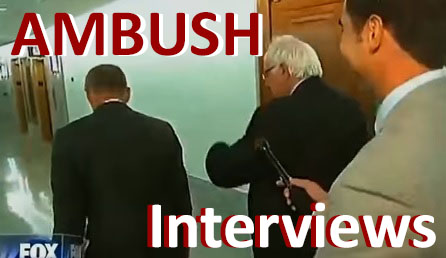


Nailing Your TV News Interview – Part 2 – The Ambush
By Howard Fencl, Hennes Communications
You’re grappling with serious challenges that threaten your organization, and perhaps your career. Someone leaks an internal e-mail to the media, and reporters have been leaving you voicemail messages all day asking for your comment on the issue. Your company’s unwritten policy is to ignore the media, and your general counsel reinforces that, advising you to leave the voicemail messages unanswered.
As you head to the parking lot after another gut-wrenching day, you’re ambushed by a reporter and a videographer just as you’re about to open your car door. The reporter is sticking a microphone in your face firing off a stream of provocative questions. You’re blinded by the light mounted on the video camera.
What do you do?
If your knee-jerk reaction is to grab the camera lens and push the videographer away, or to jump in your car and floor it, then you’re the stuff of dreams for TV newsrooms. As you may recall from my previous blog post, as a longtime TV news manager, I absolutely loved reporters who came trotting breathlessly back into the newsroom with video of anyone who got belligerent, got physical, or ran away from the camera. Particularly if that happened during a Nielsen rating period.
Why? Because it doesn’t matter whether you’ve done anything wrong or not, batting away a camera or a escaping at tire-shredding speed is great TV. It’s compelling to watch, and it makes you look like you’re the villain, caught red-handed, whether or not you’ve done anything wrong. I’d make absolutely certain that our station ran news promotional spots prominently featuring your dramatic reaction over and over again to drive more viewers to our news programs, because additional viewers mean higher Nielsen ratings. And higher Nielsen numbers mean higher TV advertising rates and more revenue for my station.
So how do you defuse ambush interviews?
- Start with company culture
Ducking the media is never a good policy. Saying nothing or saying “no comment” always carries a connotation of guilt when you find yourself in the media spotlight. There is always something you can say, even if it something as simple as “we are aware of the situation; we take it very seriously and as soon as we have more information, we will be glad to give you an update.” If your organization’s culture is intractable, bring in an outside communications consultant to help your leadership team understand why it’s important to work with the media.
- Buy time
No matter what you think of the media, and no matter how dark your mood ring is when you’re ambushed, bite your lip, take a deep breath and be as polite, calm and gracious as you can when confronted by a news crew. Tell them “I’m glad to help you with your story, but I don’t have all the background with me this second. If you meet me in my office in an hour, I can have the information you need.” When you are composed and helpful, you’re not giving the reporter anything they can use. You can bet they’re recording video of the encounter, but by being polite, you’re not giving them the bombastic video they’re hoping for.
- Create and use priority messages
Now that you’ve bought time and defused the ambush, use that time to create two or three messages you will use when the interview does occur. What’s the biggest takeaway you want a viewing audience to have on your issue? Be certain you use that message repeatedly throughout the interview. The reporter will only select one or two of your soundbites for their story, so don’t worry about repeating messages. The more you use them, the greater the likelihood they will survive editing and make it onto the news.
- Get media training
Media training sharpens your ability to communicate effectively in any situation. It demonstrates leadership and can add to your organization’s overall credibility. Do interviews the right way and news media can help reinforce important messages you need your target audiences to hear. Even if the news is bad, agreeing to an interview gives you the chance to tell your side of the story, which puts balance in news coverage.
The best insurance against your organization getting caught unprepared? Be sure you have a crisis communication plan that anticipates and helps you address nightmare scenarios your company could face. Watch our newsletter for more on why a crisis communications plan is a critical component of your organization’s success.